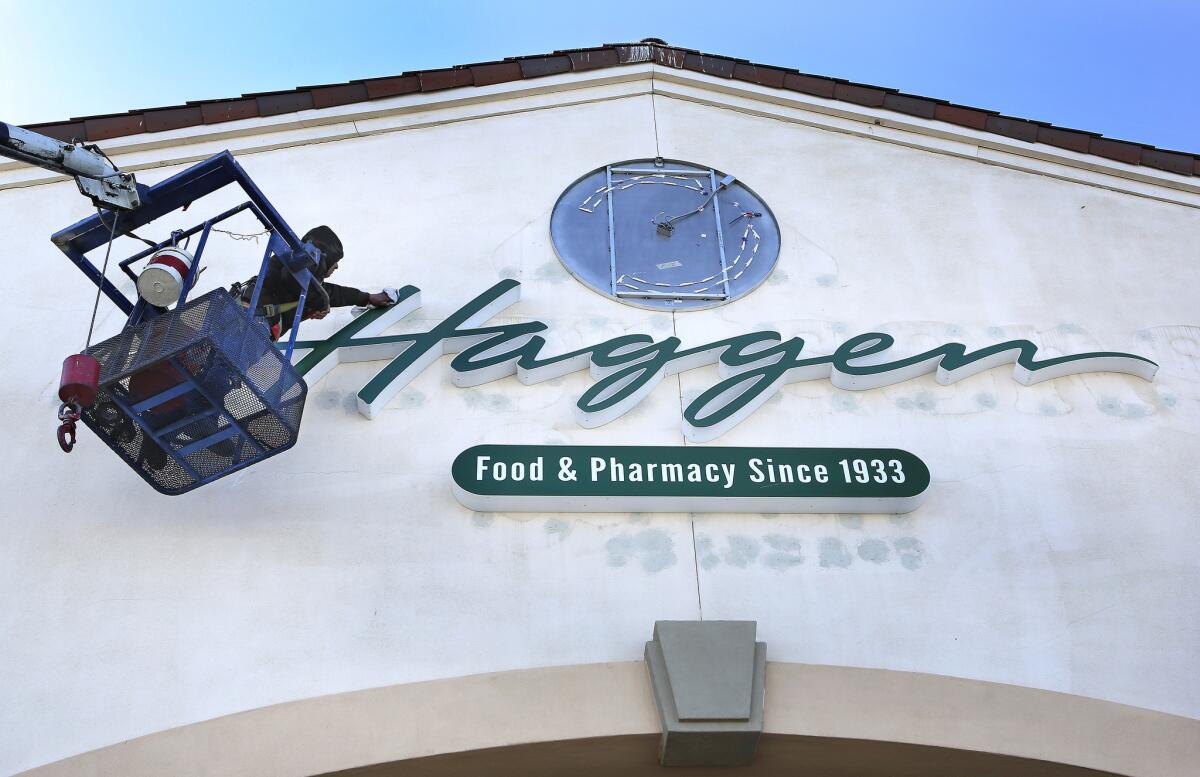Grocer Haggen closing 27 stores, including 16 California supermarkets

A construction worker wipes away dust after installing a new sign in front of a Haggen grocery store, formerly an Albertsons, in Palmdale, in March. The chain, which has struggled since rapidly expanding this year, is closing 16 supermarkets in California.
- Share via
Haggen Inc., the grocery chain that has struggled since rapidly expanding this year, is closing 27 stores, including 16 supermarkets in California.
The Pacific Northwest company said most of the locations slated for closure or sale are among the 146 Albertsons, Vons, Pavilions and Safeway stores it purchased this year. Haggen has spent the last few months converting those stores to the Haggen brand.
A company spokeswoman declined to disclose how many employees will be affected.
Haggen raised eyebrows last year after winning a bid to buy the stores, which the Federal Trade Commission had ordered sold as part of the merger of Albertsons and Safeway.
SIGN UP for the free California Inc. business newsletter >>
In a single move, the company went from an 18-store chain in Oregon and Washington to operating more than 160 spots down the West Coast, including 83 in California.
“They bit off a lot, and obviously it was a little more than they could chew,” said Jim Prevor, a food analyst and founder of PerishablePundit.com. “The losses must be very severe for them to move this quickly.”
Haggen came in at a time of heightened competition in the Southern California grocery industry.
Online players such as Amazon.com and Google are getting into food delivery. More specialized chains such as Trader Joe’s and big-box stores such as Wal-Mart also are upping their food offerings. German discount grocery chain Aldi recently announced plans to open 45 Southland stores starting in March.
In a land thick with rivals, Haggen has failed to entice consumers, analysts said.
Shoppers have complained that its shops charge higher prices for the same quality products as the supermarkets they replaced.
When its first California stores opened in March, about 1,000 items — or about 2.5% of a store’s products — were erroneously overpriced at 10 supermarkets in Los Angeles, Orange and San Diego counties.
A smaller number of goods were incorrectly underpriced. In shoppers’ minds, the chain has yet to recover from this stumble, analysts said.
Last month, the Bellingham, Wash., company laid off employees and cut worker hours in the face of what it called “unprecedented” competition. It is also dealing with a lawsuit from Albertsons that accuses the grocer of fraud in failing to pay millions as part of the sale.
Haggen warned Thursday that additional stores may be closed or sold as part of its “right-sizing strategy.”
The California stores targeted for closure include four in Orange County, four in Ventura County and six in the San Diego area.
A Bakersfield location and a store in Los Osos, near Morro Bay, also are shutting down.
“By making the tough choice to close and sell some stores, we will be able to invest in stores that have the potential to thrive under the Haggen banner,” Bill Shaner, head of Haggen’s Southwest operations, said in a statement.
Haggen is known in its Pacific Northwest home base as a chain with great customer service and high-quality products, a midway point between a grocer such as Albertsons and an upscale market such as Whole Foods.
But in California, Haggen has failed to differentiate itself to potential shoppers and has struggled in operating a vastly larger chain.
“They have no brand identity in Southern California. It’s basically ‘Haggen, who?’ from the consumer perspective,” said Lloyd Greif, chief executive of Los Angeles investment banking firm Greif & Co.
Analysts said Haggen may still succeed after dumping its poorest-performing stores and concentrating on its profitable locales.
But more likely, the company will continue selling additional stores so that Comvest Partners, the investment firm that owns the majority stake in Haggen, can make some money, observers said.
“Comvest, like many private equity firms, is always trying to monetize its investments as quickly as possible,” said Burt Flickinger III, managing director of Strategic Resource Group.
The Southland grocery industry is so saturated, he said, that Haggen may have trouble finding buyers willing to pay a good price.
Possible buyers include ethnic markets such as Northgate Gonzalez, based in Anaheim, or more specialty retailers such as Bristol Farms, analysts said.
With Aldi heading to California soon, the fight for shoppers will get even more intense for Haggen.
From a competitive standpoint, Greif said, “it doesn’t get any better from here on out.”
Twitter: @ByShanLi
ALSO:
In Alhambra, demographic shift reaches the grocery store
Albertsons sues Haggen over $36 million in grocery inventory
El Super grocery chain settles complaints it refused to bargain with union
More to Read
Inside the business of entertainment
The Wide Shot brings you news, analysis and insights on everything from streaming wars to production — and what it all means for the future.
You may occasionally receive promotional content from the Los Angeles Times.











